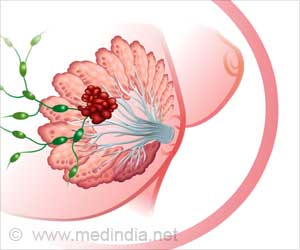Highlights
- Chemotherapy drug doxorubicin when given in combination with one anti hypertensive medication before the intake of Herceptin can reduce heart problems associated with breast cancer.
- Herceptin is generally used to treat aggressive form of breast cancer called HER2-positive but it can cause heart problems in patients.
- Patients with HER2-positive breast cancer taking both doxorubicin and Herceptin and adding either an ACE inhibitor or a beta blocker can significantly reduce the chances of heart problems.
A new standard of care has been developed to reduce the risk of cardiotoxicity in patients undergoing treatment for HER2-positive breast cancer.
FDA first approved Herceptin to treat an aggressive form of cancer- HER2-positive breast cancer. It had proved to be a stunning success in reducing cancer recurrence and improve survival rate, but due to its heart problem causing nature, physicians stopped prescribing Herceptin treatment or reduced the frequency of treatment if a patient's ejection fraction (a measure of the heart's ability to pump blood) was less then fifty percent.
The American Heart Association has warned doctors and patients to consider heart risks associated with Herceptin before they give or take the medication.
The placebo-controlled study explored whether two classes of drugs -- ACE inhibitors and beta blockers-- preserved a patient's cardiac function during chemotherapy or not.
"Herceptin is arguably the most effective treatment for HER2-positive breast cancer. These patients are already anxious about their future. We don't want to avoid this exceptionally effective treatment just because it might cause damage to the heart." said Guglin.
However, they were a significant decrease in cardiotoxicity for patients taking either beta blockers or ACE inhibitors who received doxorubicin before Herceptin: cardiac event rates in the placebo group were 47 percent, compared to ACE inhibitors (37 percent) and beta blockers (31 percent).
"In the past few decades, we've made huge strides in successfully treating cancers that used to be very deadly for patients," said Dr. Mark Evers, director of the NCI-designated UK Markey Cancer Center. "But it's important to also think about the patient's future and to help them maintain the best possible quality of life. This study provides valuable information for oncologists who are treating patients with HER2-positive breast cancer, and may help shape the new standard of treatment for this cancer in years to come," said Guglin.
"For example, should we always treat with both doxorubicin and Herceptin? Should we re-evaluate our minimum standards for heart function? What if the patient's EF is less than 50 percent but is asymptomatic? And should the patient's wishes carry more weight in the equation?" Guglin said. "All of these questions require careful consideration, but this part is clear: giving an ACE inhibitor or beta blocker to patients taking doxorubicin and Herceptin for HER2-positive breast cancer will significantly reduce the risk of cardiotoxic side effects," said Dr. Maya Guglin.
Source-Medindia
















